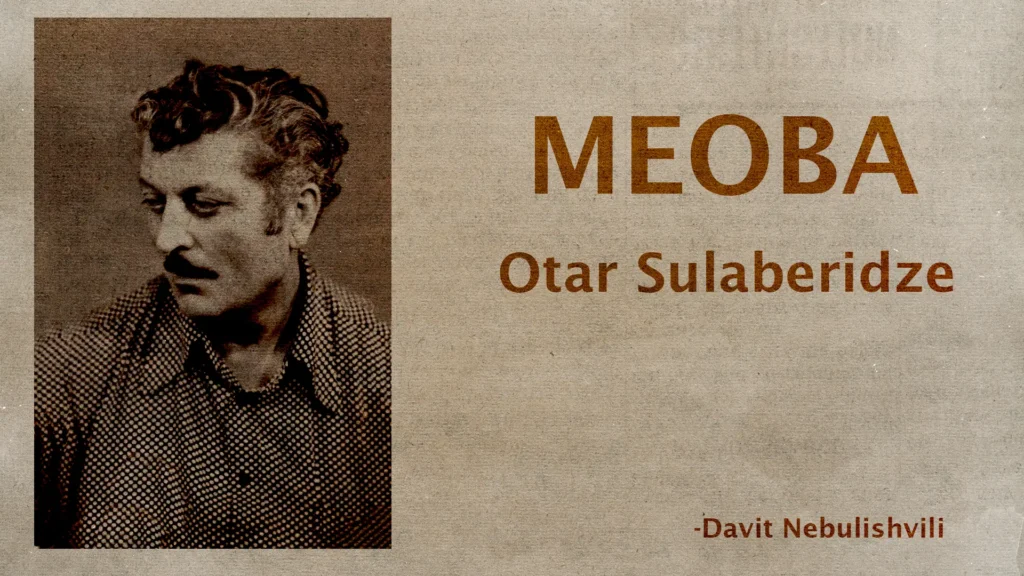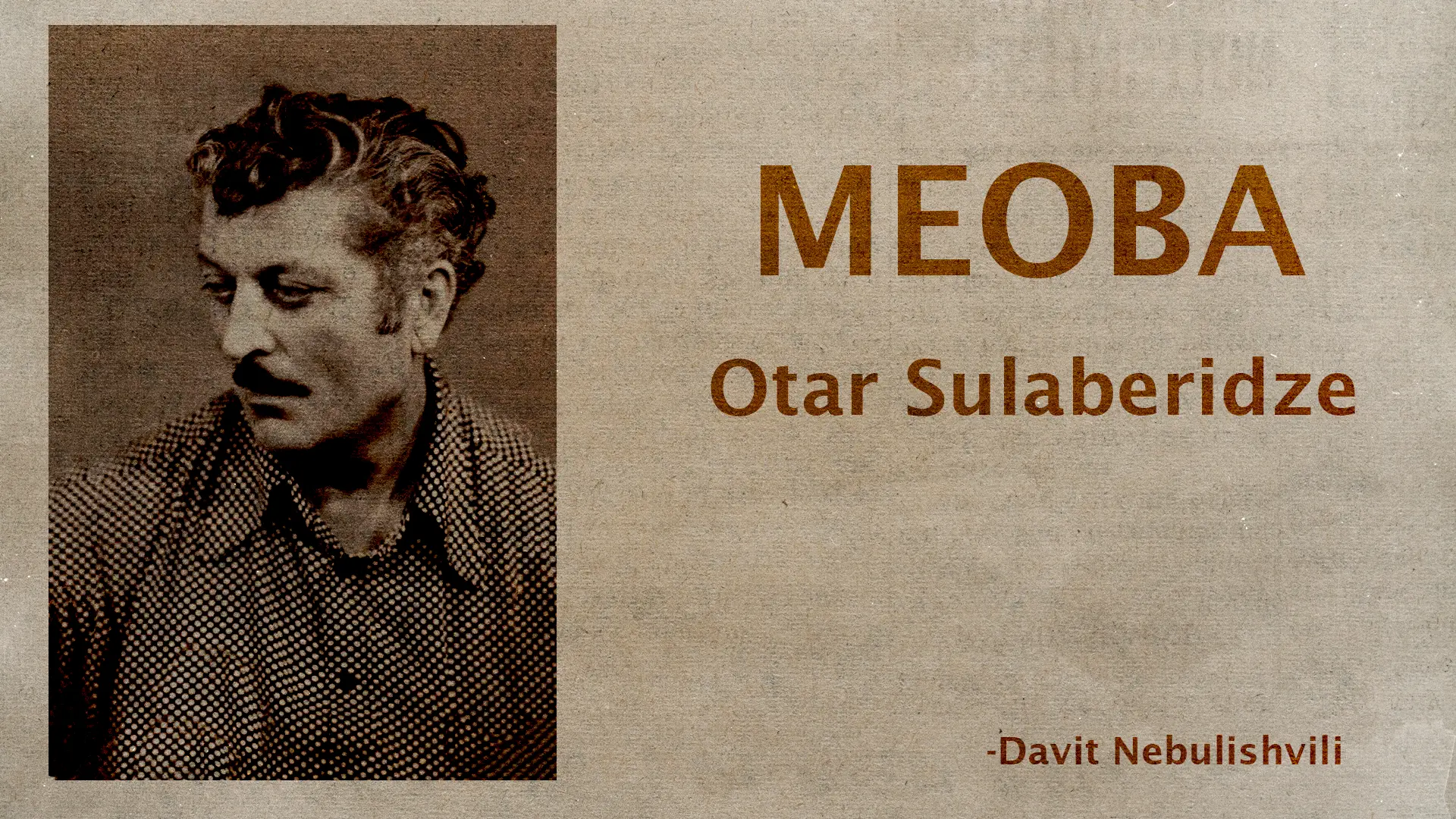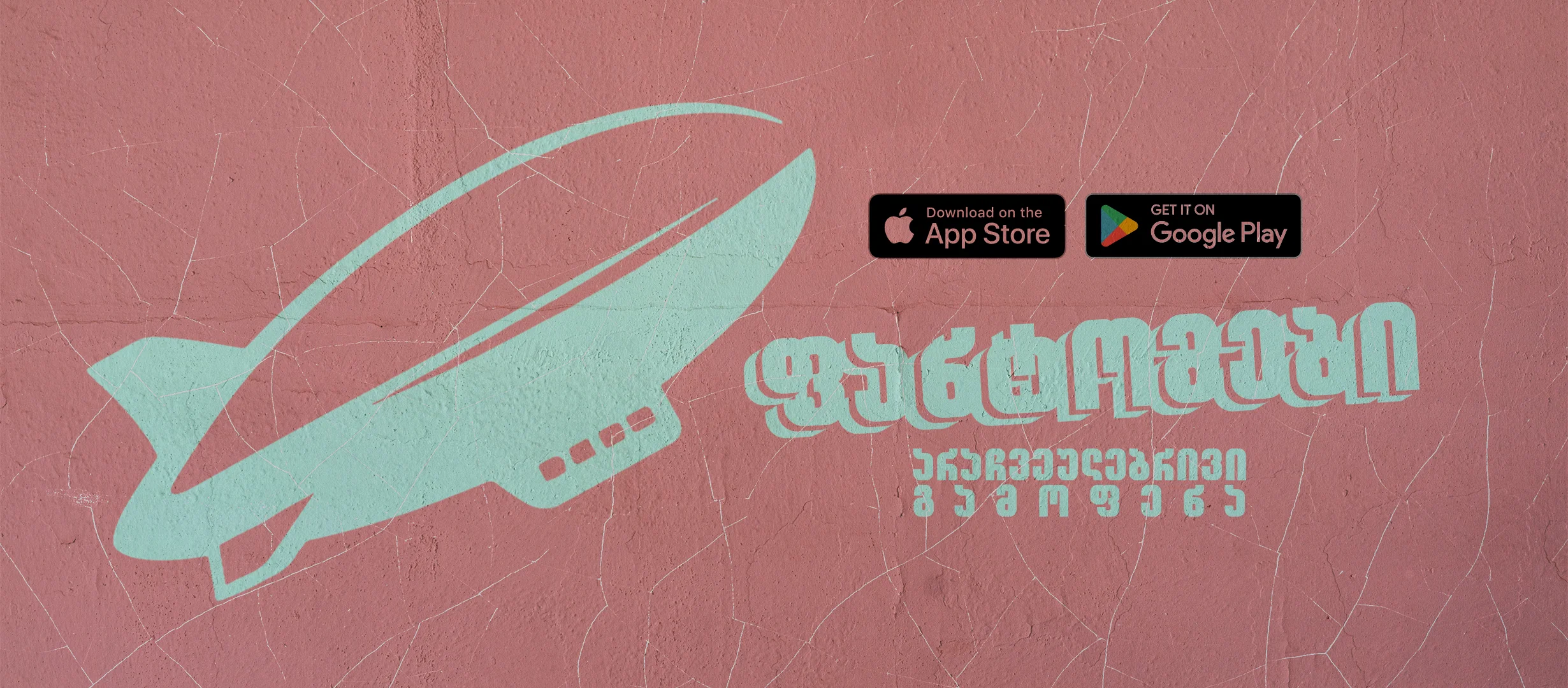
(*Meoba translates as selfness, identity, from the Georgian word Me – I)
Author: Davit Nebulishvili
More than a hundred families lived in our airship (the nickname for our apartment on Chavchavadze Avenue). Ten meters wide, the courtyard echoed with the patter of little feet day in and day out. Even the sound of an airplane landing at the airfield couldn’t drown out their noise; only once in a while, not every day, in the evening, an amazing silence fell when all the children, immersed in their own worlds, paused: “Meoba is coming!” They would watch, entranced, as a tall, handsome man with the swaying walk of a sailor approached, bestowing an indescribable smile upon both young and old. He would snatch the ball from the sweaty boys at our entrance and, with surprising precision, place it into a makeshift basketball hoop, the ball rolling securely back to their feet: once, twice, three times. Then, he’d pinch the nearest boy on the nose, hand off the ball, and head into the building.
“Meoba” was a nickname (a certificate in the ancient Georgian language) that Otar Sulaberidze received during a time when commendation certificates with portraits of Lenin were handed out to everyone like candy.
This is different! It shares nothing with Freud’s all-encompassing “I,” much less with the meaningful English “I” or the Russian “Ya” with its chest puffed out. Furthermore, no dictionary explains the Georgian concept of “selfhood”( meoba), and I believe it’s a concept uniquely Georgian. The phenomenon existed before Otar Sulaberidze, just as there is no Georgian iris or Georgian wagtail anywhere else.
…Our neighbor from the following landing would come to visit us at night and only when drunk (when he was sober, he was surprisingly modest, and we almost forgot he existed). He never rang the bell but would instead knock on the door with a dull thud. We all knew it was Otari. “Is Shota home?” he would ask about my father. This question was his pass; he would enter decisively and without question upon receiving an affirmative answer. Then came the night gatherings, attended by men only. We three would sit in a room stained with cigarette smoke: one tall, another shorter, and myself, a child. They spoke in low voices, both baritones and both not given to verbiage. Discussing any topic, they understood each other with half a word. Only now, being their age, do I grasp the depth of those conversations (back then, I was surprised when I saw both the professor and the thief who came to ask Meoba about something), and somehow, the past was always the main topic of discussion. What else could a standard-bearer of the 414th Georgian division and the commander of the reconnaissance squad of the same division talk about? A member of the greatest cohort of Georgian basketball, who had experienced the European theater of war and sports. He only remembered injuries from sports and from the war – a single episode in Crimea: during a crucial maneuver in the gray zone, he descended into a well-laden with flasks. There, he encountered a German soldier, and a struggle ensued… ” When I returned from the well, the boys, who hadn’t drunk for three days, did not take a sip from their flask, tasted the blood in the water… It was an incredibly beautiful German boy, taller than me, blue-eyed, blond. He had gone down to fetch water; what else could I have done? He visits me in dreams and wakes me screaming, ‘What have they done to us? Who the hell are Hitler and Stalin, damn them?’”
Back then, only those with strong spirits and will could think differently. He was unlike anyone else. He led a bohemian life. He was as solitary as a finger, not like grass growing on a rock but like a mighty oak embracing its brethren. Friends cared deeply for him: they made him co-owner of a “Gasoline Station” in Balakhvani. The earnings for three months (both our pockets were full, his and mine) he gave away to known widows and orphans, then threw a feast at the “Kutaisi” restaurant and gave me the last remaining three rubles.
His friends assisted him: they “secured” for him a three-room apartment in a prestigious area. Upon entering, he encountered a woman with many children who fell beside the crib, screaming and in tears, “I won’t leave from here.” It turned out she had squatted in the apartment. “Quietly, don’t wake the child,” he told her, silently placed the housing order on the table, and left. Not everyone could do this.
He also cared immensely for his friends, who called him “Meoba” – those who made his grave after his death and overturned a glass in his memory every May 2nd, on his birthday. For these friends, he was sometimes seen battling the waves of the Rioni River or fighting hooligans on Gabashvili Hill armed with knives. He did such things for these friends that the city buzzed for a whole month: he and Achiko Sulaberidze (his cousin) flew to Tbilisi in a small twin-engine IL-14 plane. In the sky, the plane suspiciously tilted to the side. The cockpit opened, and the ship’s commander emerged, looking like a hermit, revolver in hand. He stopped by Achiko, not because Achiko was known as the city’s leading trumpet and the entire city knew him as the Kutaisi Louis Armstrong, but because he weighed 160 kg and was the heaviest among those present. “Get up!” the pilot told Achiko, making him switch places with a slim man on the opposite side. Everything was done wordlessly. The pilot returned to the cockpit, and the plane leveled out. The people sighed in relief, albeit briefly, as the plane now tilted to the other side. The conversation ceased, and everyone’s attention turned to Achiko. The plane commander emerged again, hand on his pistol, approached Achiko, and the man died of embarrassment. The pilot placed Achiko in the aisle and returned to the cockpit. The plane straightened out! Thus, “standing between the rows,” Achiko flew peacefully and landed at the capital’s airport. When Meoba thanked the pilots and slyly winked at them, Achiko realized these were his pranks and chased after Otar “to kill” him.
When Otar Sulaberidze died, he was laid out in the square in the center of the city, and there he bid farewell to Kutaisi. It was an honor worthy of a figure at the level of Akaki Tsereteli. These two individuals were astonishingly similar not in their poetry but in their fates! Yet, Meoba was profoundly in love with poetry; I often noticed tears in his eyes while reading poems. He particularly adored one poem by Lado Sulaberidze and always concluded his nightly recitations with the words: “My father left me the night, my mother asked for a black dress, the one I await does not come. Hence, I am sad.”
It is said that a Georgian feast is an academy. Even now – when boys stand, square their shoulders, look into each other’s eyes, and say: “Let’s drink to us, to our essence,” they somehow remind us of Otar, Sulaberidze, our “Meoba” – they become just as charismatic, handsome, tall, generous. I believe that a part of Otar’s heart lives in theirs. This tiny piece throbs and will continue to beat as long as Kutaisians exist and as long as people here continue to bestow nicknames upon each other.


